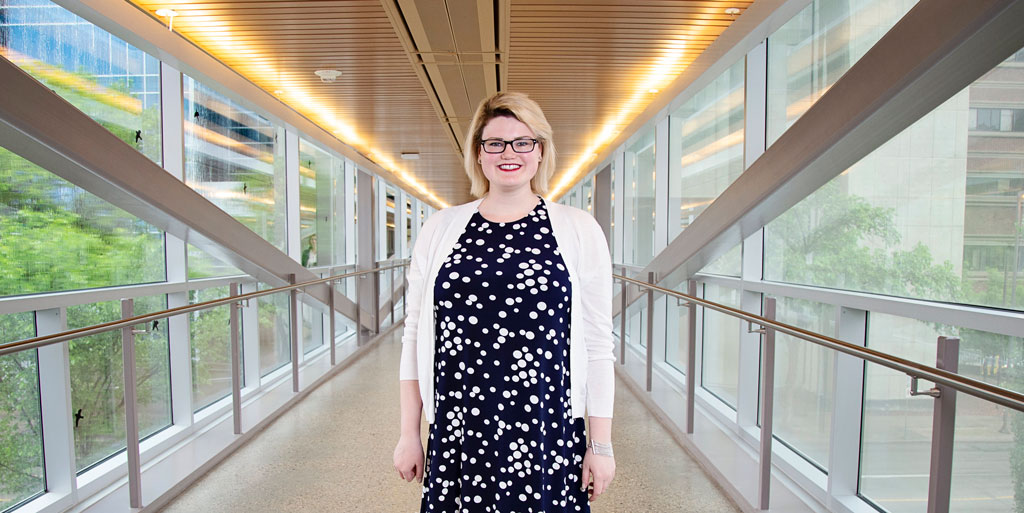
Rebecca Clark is the MSc recipient of the Dean's Gold Medal. The Dean's Gold Medal was created as a legacy initiative during the School's 10th anniversary celebrations. The award is intended to recognize superior academic performance.
Rebecca Clark, recent master of science (MSc) graduate, knew she wanted to go into public health, specifically epidemiology, since she was in elementary school.
"I remember being in school and learning about different statistics and locations of infectious diseases, and immediately falling in love," says Clark. "Looking at the computer I could see all the different diseases mapped out- it was high in this country, it was low in that country. Trying to figure out why was so interesting; I was hooked."
After completing her bachelor's degree, she applied to the School of Public Health because of the MSc in epidemiology program and because of Associate Professor Yan Yuan, who would become her supervisor. Clark came into the program with a passion for infectious disease, but was open minded when it came time to select her thesis topic. She wanted to explore all areas of research and potential projects. She landed on risk prediction for nonsurgical premature menopause in childhood cancer survivors.
"The application of this research was extremely attractive to me," explains Clark. "I knew I wanted to make an impact, and to work on a project that provides an estimate that could potentially improve the quality of life and future fertility of childhood cancer survivors was a great synergy."
Clark says that over the last several decades, the odds of surviving a childhood cancer diagnosis has increased significantly. But sometimes surviving cancer is just the base of the mountain that the survivor will have to climb.
"Being a childhood cancer survivor, male or female, can increase your odds for chronic conditions," says Clark. "But if you are a female childhood cancer survivor, you are at increased risk of developing nonsurgical premature menopause (NSPM). Very few people think about an 11-year-old girl having to go through menopause right after they've survived cancer but this happens to approximately nine per cent of survivors aged 0 to 21."
NSPM has a significant impact on future fertility and a reduced window for reproductive years. Additionally, childhood cancer survivors who experience NSPM are more likely to report feelings of anxiety, depression and insecurity. Clark's research hopes to mitigate this symptoms.
Through her thesis research, she helped develop an algorithm that can predict the risk that a female childhood cancer survivor has of developing NSPM. The risk estimate will assist and inform oncologists so that when they have conversations with their patients they can talk about life after treatment.
"If an eight-year-old patient has a high risk of premature menopause within 10 to 20 years of their cancer diagnosis, then maybe there are interventions that can take place," explains Rebecca. "If they have high risk, perhaps ovarian tissue preservation or other fertility preservation techniques can take place before treatment. These interventions can then increase the odds that the patient will have the opportunity to reproduce in the future."
As of right now, the algorithm is not ready for release as the team is modifying the model to prepare it for use. Once finalized, Clark anticipates it will be on a web or application platform that clinicians can use to better inform themselves and their patients.
"Surviving cancer at any age is enough, let alone facing it as a child," says Clark. "So it's extremely rewarding to know that the work we've done will eventually help childhood cancer patients worry a little less about what they might face in the future."
Rebecca Clark is the MSc recipient of the Dean's Gold Medal. The Dean's Gold Medal was created as a legacy initiative during the School's 10th anniversary celebrations. The award is intended to recognize superior academic performance.